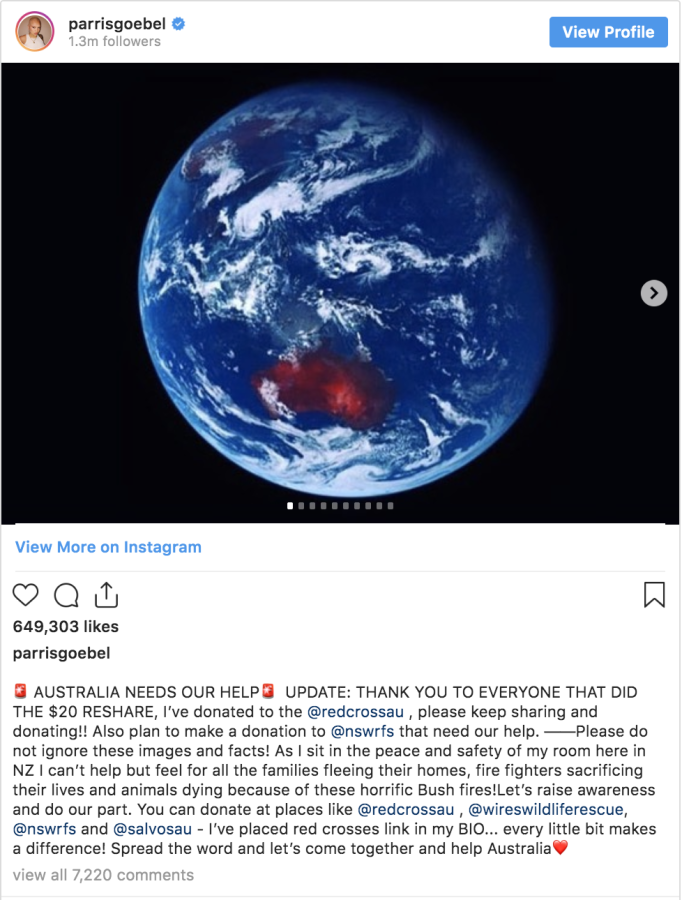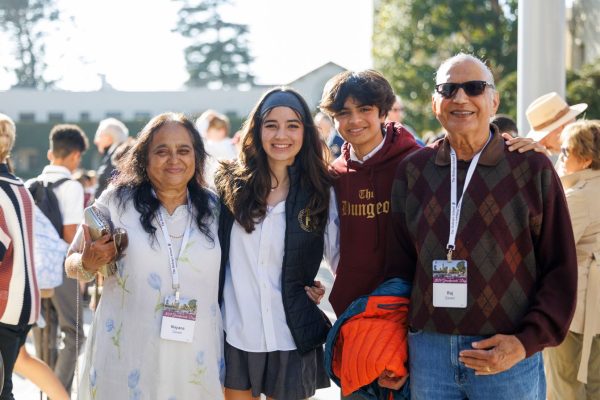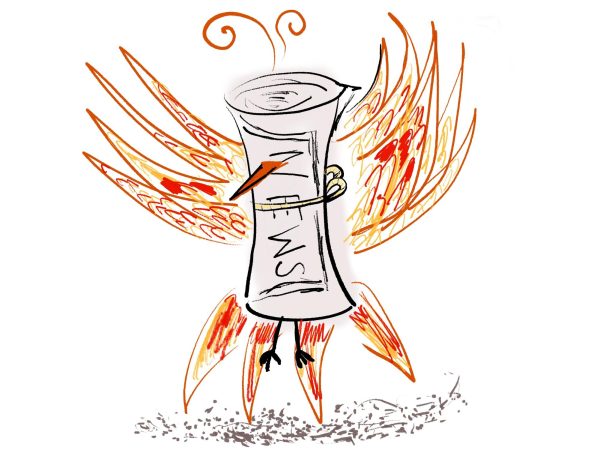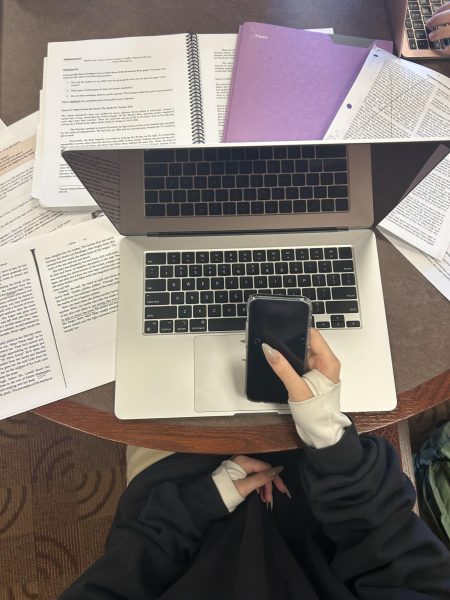Altruism and Advocacy: The Ethics of a Public Celebrity Donation
Celebrity Parris Goebel pledged that she would donate $20 for each share of her Instagram post about the Australian fires.
As Australia was overwhelmed with the deadliest wildfires in decades, social media was overwhelmed with celebrity posts and Instagram stories with captions like “Pray for Australia,” or “I Just Donated – You Should Too.” But should people look to celebrities as admirable activists?
Some students have argued that people are obligated to contribute what they can, so celebrities—being generally wealthier—should be donating more than the average population. Senior Sarah Delfino thinks, “When it comes to richer celebrities, you want them to give more money.” She mentioned that she thought wealthy people had a moral obligation to give what they could. Amazon CEO Jeff Bezos—the richest man on Earth—gave one million Australian dollars ($690,000) to the Australian wildfire recovery, less money than he made in five minutes in 2018. People attacked him for donating less than Kylie Jenner—who pledged one million dollars, but has a net worth of more than $100 billion less than Bezos. “I think that when celebrities have so much money, you expect them to have to donate a lot more, and so when they’re not donating enough, they look selfish and cowardly,” Sarah explained.
These public announcements call into question the ethics of a public donation. Is a donation still generous if the only purpose is to put up a show? Sarah explained that she supports celebrities who donate for public relations purposes, explaining, “Even if they’re donating for PR, their money is still going to help people.” After Kim Kardashian West tweeted, “Climate change is real,” on January 2 and encouraged donations on her Instagram story, a commenter called her out on Twitter, saying, “Nothing gets me more heated than to see the Kardashians/Jenners talk about climate change/wildfires & not donate even a penny.” West responded, “Nothing gets me more heated than to see people think they know what we donated to and to think we have to publicize everything.” Her sister, Khloé Kardashian, argued, “Good deeds should be done with intention and not for attention.”
Parris Goebel, a choreographer from New Zealand who has worked with singers like Justin Bieber, Jennifer Lopez, and Rihanna, pledged that she would donate $20 for each share of her Instagram post about the fires, saying “Let’s raise awareness and do our part.” The post attracted 650,000 likes. Some commenters responded critically, making accusations like, “Why will you only donate if people share? Sounds more like publicity for yourself rather than anything else” and “Where’s the proof?” Goelbel defended herself on Twitter: “I’m not getting paid to post about the fires, I’m not gaining followers. This is real life, and if my country was on fire I would hope the world would speak up too and help out.”
But donations are not the only situations where celebrities use their fame and influence for advocacy. In Meryl Streep’s 2017 Golden Globe acceptance speech, the actress advocated for equality and considerate treatment in the workplace. She called out Donald Trump’s behavior towards a reporter, saying “Disrespect invites disrespect, violence incites violence. When the powerful use their position to bully others, we all lose.” In one 2016 Academy Award acceptance speech, Leonardo DiCaprio advocated for Native American property rights. In his speech for his first Oscar, he endorsed action against climate change in order to benefit the underprivileged, saying passionately, “Let us not take this planet for granted.” Actor Marlon Brando from The Godfather boycotted the 1973 Oscars to protest the film industry’s poor treatment of Native Americans, sending a Native American woman and activist in his place. During Sean Penn’s 2009 Oscar acceptance speech, he told everyone who voted against gay marriage to “sit and reflect and anticipate their great shame.” Recent decades are full of celebrities using their platforms to spread awareness or protest for their beliefs. During a concert tour stop in Sydney, Australia, Elton John declared, “There are people out there who have lost their lives trying to save homes. There are people who have lost their lives and their homes.” During the 2020 Golden Globes, Cate Blanchett spoke to the audience, “There are a lot of Australians in the room tonight, and I know we’re all very grateful for the call-outs to our fellow compatriots who are suffering under the bushfires.”
As well as one-off donations and speeches, in past years, celebrities have filled social media with images of themselves performing charity work developing countries or creating new foundations. The charity organizations often have the celebrity’s name directly in the title, like the Michael J. Fox Foundation for Parkinson’s Research, which funds research attempts towards curing Parkinson’s disease; The Leonardo DiCaprio Foundation, which raises awareness and provides funds for conservation and climate change; and Oprah’s Angel Network, which constructs homes for Habitat for Humanity. These organizations have raised billions of dollars for worthy causes, but the fact that the celebrities’ names are in the title suggests that more than just helping the needy is on their minds. “I think it’s a good thing for the most part because they’re using their influence in a positive way,” Nadia Bitar (‘22) explained, but Kira Fanelli (’23) noted that, “It can be kind of condescending when they flaunt it a lot.”
“Those fires are devastating, and if they’re donating massive amounts of money, who am I to complain?” Costume Designer Ms. Jean Moroney pointed out. Public advocacy and donations can raise awareness and promote support. However, continued overuse of their social platform—like inserting activism into an acceptance speech for an award—implies that celebrities are more interested in gaining popularity or appearing kind and benevolent than they are in the charity.

Clare Malhotra was born in Boston, Massachusetts and moved to La Jolla at age nine. She is currently a senior, and this is her third year on The Tower....







